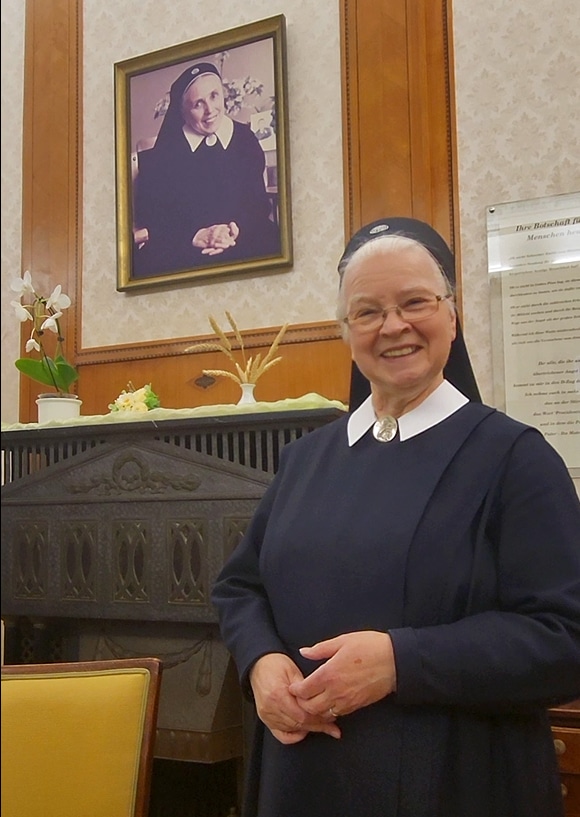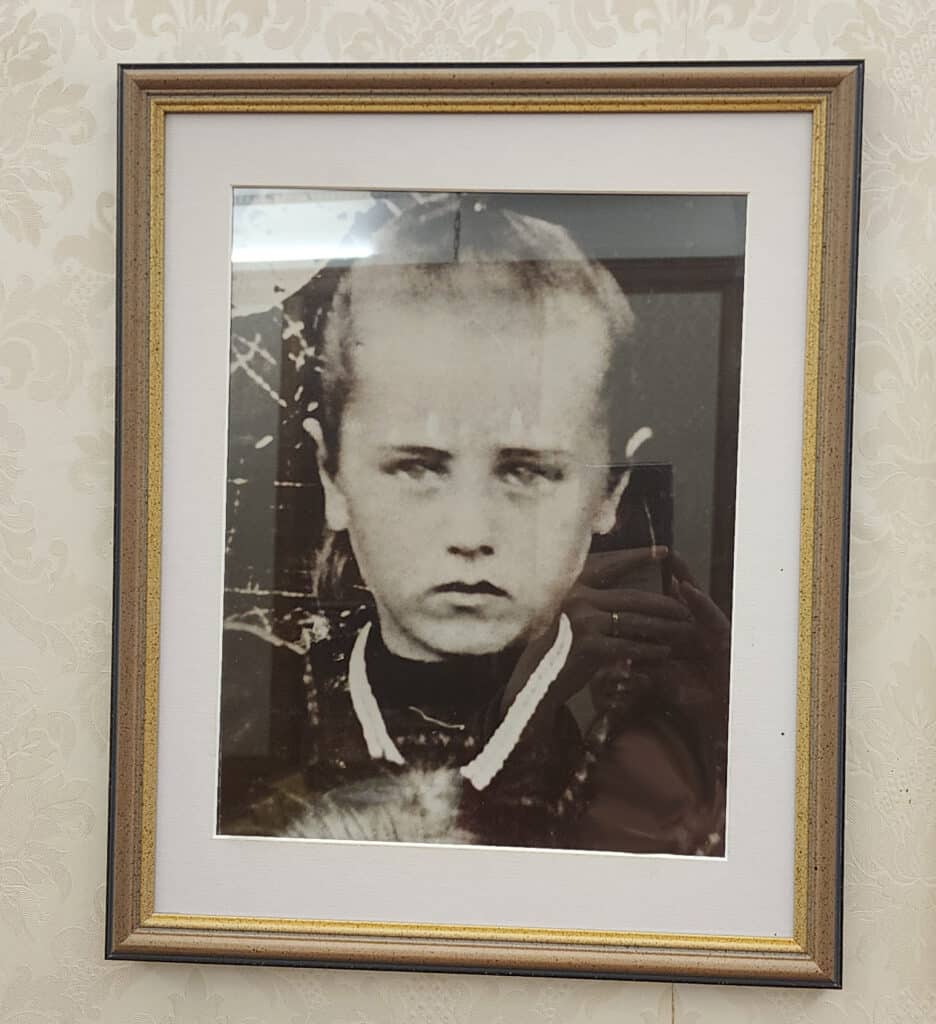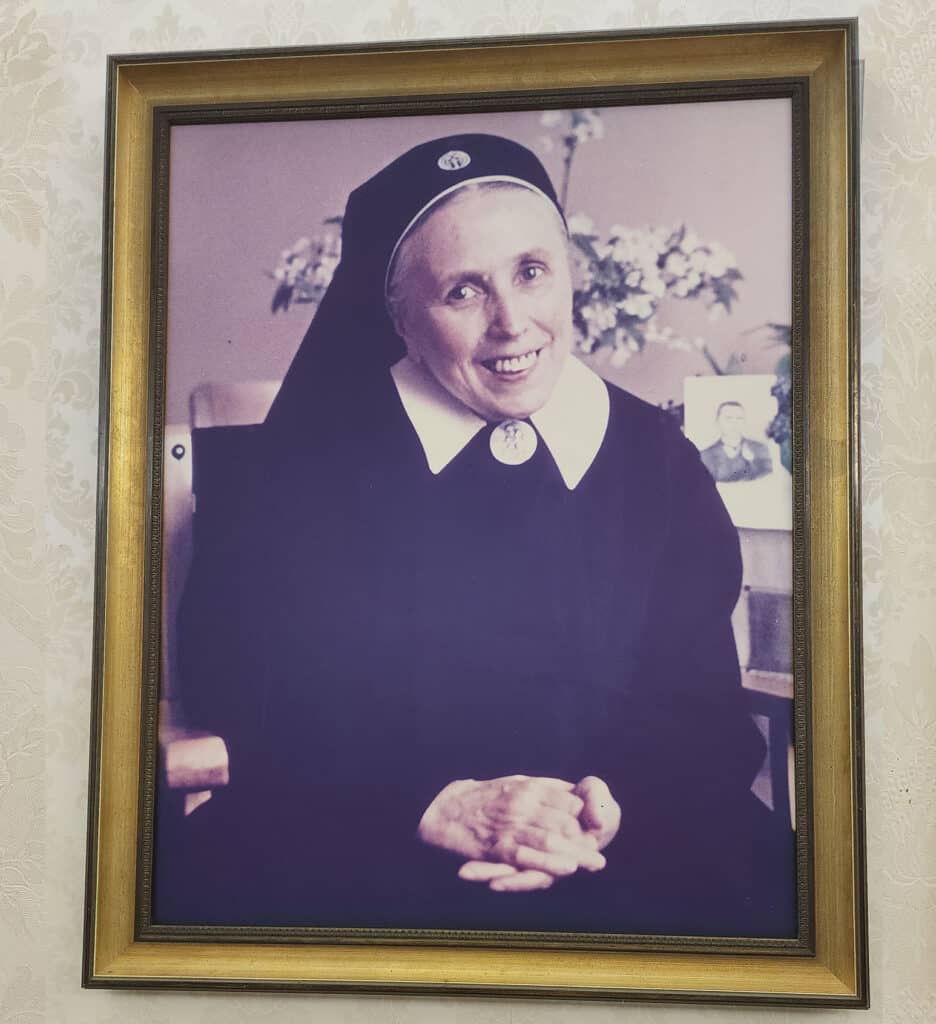Sr. M. Susann Fendel lives in Metternich, Germany, in the house where Venerable Sr. M. Emilie Engel once lived. One of her tasks is to guide pilgrim groups to the historical sites of the house and to introduce them to Sr. M. Emilie.
On November 20th, when we commemorate Sr. M. Emilie’s death, Sr. M. Susan talks to us about her and what she has to teach us today.

November 20 marks the anniversary of Sr. M. Emilie’s death. What would Sr. M. Emilie say to people today, in a world where war and so many problems prevail?
She was a daughter of Divine Providence, which means that her faith in Divine Providence was solid. Perhaps she would also remind us that human beings must look for God behind every situation and ask Him what He wants in each particular case.
In other words, the God of Providence wants us as collaborators, wishing that we help to make this world in which I or we live a better, more loving and more peaceful place. And, if I do that, then I will be a model for others who should do the same. Everyone should do what they can so that the world can become a better place: more peaceful, more loving and more pleasing to God.
How would you describe Sr. M. Emilie as an educator?
She was a loving mother, even as a teacher. When she was not yet a Sister of Mary, she took care of the children she had in the school and they were often children from poor backgrounds – underprivileged socially – where the parents worked in the mines, the father worked in the mines, the mother was often afflicted with illness, and she took care of them. She said, for example, that she felt more affection for those who were poorer. That is where she poured most of her love. Because she also realized how much they needed it. And God loves me: yes, then I also have the task of loving others.
Something that just came to my mind. Here [in Metternich] people would come wanting a room in the post-war period, wanting to live here or just wanting something to eat, because it was a time of great poverty. And we ourselves, as a community, were very poor. It is said that once a family asked to stay here, but the Sisters did not have a room available and so they were asked to leave. Sister M. Emilie heard about it and said that wasn’t acceptable. She found out where they were and gave them money so they could at least pay for their lodging. That is one example:
Another example happened down herein the kitchen: the Sister in the kitchen was often asked to give something to the poor people and she often did it here on the staircase. Then Sister Emilie told her: “What you give to the poor is never lost. You will get it back a thousand times over.”

If you could characterize Sister M. Emilie in one sentence, what would it be?
I’m going to say it in a big way. Sister Emilie embodies the image of man, the Christian image of the man that our founder, Father Kentenich, wanted to give to the world and to the Church: a person who is detached interiorly and who, from her inner freedom, gives herself completely to God and fulfills His will.
She represents the new man in the new community. An example of this is:
New man, that means from within, independent, but it is what I want. I don’t do it because I have to, but because I want to. If you – as I always do with people who visit this room – take a look at Sister M. Emilie as a child and then look at Sister M. Emilie as a mature woman, can you make a comparison? And most people do that very quickly. They say, “oh, as a child she seems very serious and tough and as a teenager nervous, yes, and then shortly before her death, free, open.” A person who is under inner pressure becomes a free person, a new person who loves from within.


She learned this from Father Kentenich. Yes, there she learned that God is not a strict judge, as she thought as a child, as God was seen at the time: God is the judge, he punishes, I must do everything to please him.
For her, this fear was not a fear of “I cannot do this (or that)”, but it was: “How can I make God happy, how can I please him?”.
As an adult, as a disciple of our founder, Father Kentenich, she learned that God is not just a strict judge, but a loving Father. And as a child, I can always turn to the loving Father. I can tell him when I have done something wrong and I have the courage to start again.
Translation: Maribel Acaron
